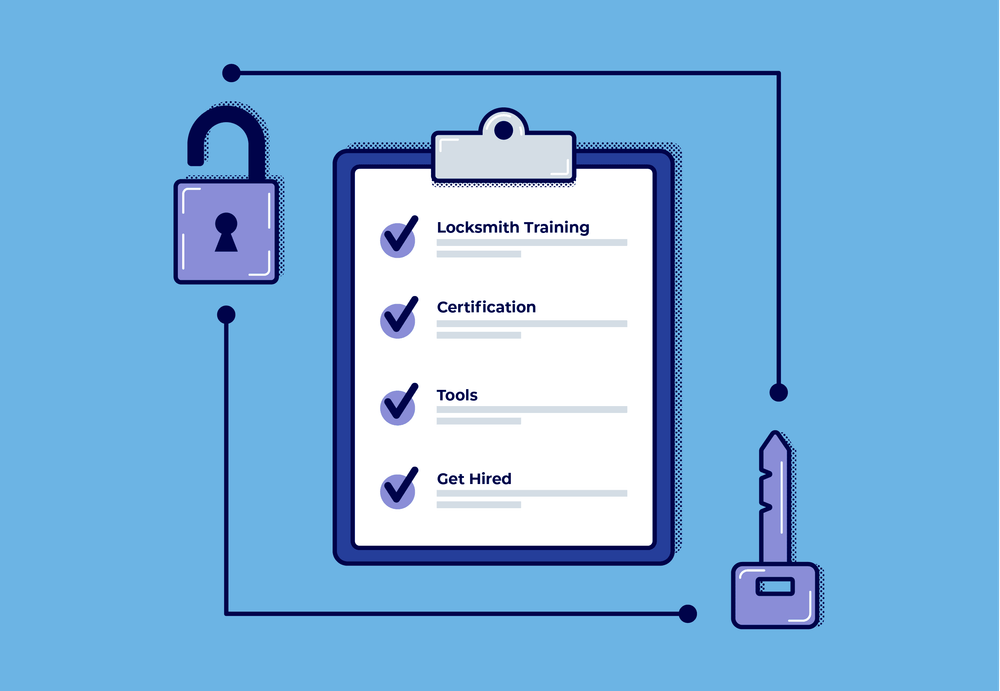How to Become a Locksmith: Your Guide to Starting a Career in Locksmithing
Master the essential skills and steps in locksmithing with our comprehensive guide. Enhance your knowledge and tackle any lock challenge!
Jul 11, 2025

Locksmiths play a vital role in public safety by helping people secure homes, businesses, and vehicles. Whether you're interested in working with master key systems, electronic locks, or offering emergency services, locksmithing offers a hands-on, flexible, and rewarding path. If you're wondering “how to be a locksmith” or “how do you become a locksmith ,” this will walk you through every step of the journey, from training and licensing to launching your own locksmith business.
Why Become a Locksmith?
The locksmith profession is ideal for those who enjoy solving problems, working with their hands, and providing essential services. Whether it’s helping a family regain access after lost keys, installing locks for a security company, or assisting with vehicle systems, there’s no shortage of ways to apply locksmith skills.
Aspiring locksmiths are often drawn to the career for its independence, entrepreneurial potential, and high demand across both residential and commercial sectors.
Step 1: Understand the Role and Responsibilities
Before diving into locksmith training, it’s important to know what a locksmith actually does. A locksmith's responsibilities include:
- Repair locks and replace broken ones
- Cut keys and change combinations
- Install security systems and digital locks
- Help clients who’ve lost keys
- Respond to lockout calls as part of emergency services
- Work with security companies or operate independently
- Offer services as automotive locksmiths or residential/commercial specialists
Locksmiths must have a good understanding of different locks, keys, and mechanical or digital access systems. Many locksmiths develop specialties such as auto locksmithing, forensic locksmithing, or safe and vault servicing.
Step 2: Evaluate Your State’s Licensing Requirements
Currently, 13 states require a locksmith license, including Texas, California, Alabama, Illinois, and others. You can check resources/blog/locksmith-license-by-state or visit local government and trade association websites, which often list the requirements for your area. Generally, to become a licensed locksmith, you’ll need:
Basic requirements:
- A clean criminal record
- Completion of a locksmith training program
- Proof of certification
- Business-related requirements (if applicable):
- A registered business (if self-employed)
- General liability insurance
Licensing ensures locksmiths meet safety standards and are accountable to regulatory agencies. Be sure to research requirements for your state and other states you may operate in.
Step 3: Choose the Right Locksmith Training Program
When it comes to locksmith training, there are several paths to choose from, depending on your goals and state requirements. A strong training course includes both theory and hands-on training in areas like:
Core skills covered:
- Rekeying and lock installation
- Safe and vault services
- Automotive locksmithing
- Master key systems
- Alarm and access control systems
- Locksmith tools usage
Training formats to consider:
- Vocational schools
- Trade schools
- Local community colleges
- Courses available online
Many aspiring locksmiths opt for an online locksmith training course to get started quickly and affordably. These programs offer flexible learning and are often paired with hands-on experience through apprenticeships or internships.
Step 4: Gain Practical Experience
To become a successful locksmith, it’s not enough to simply study; the job requires locksmiths to have real-world experience. Apprenticeships or entry-level opportunities at a locksmith company give you exposure to tools, customer service, and business operations.
During this phase, you’ll:
- Practice key duplication and lock installation
- Learn to repair locks in the field
- Shadow an experienced locksmith
- Get familiar with locksmith tools and equipment
- Build confidence handling a variety of situations
Many locksmiths report that hands-on training was the most valuable part of their journey.
Step 5: Get Certified
Though not always required, certification from a recognized trade association adds credibility to your skills. Organizations like the Associated Locksmiths of America (ALOA) offer multiple levels of certification, including:
ALOA Certification Levels include:
- Registered Locksmith (RL)
- Certified Registered Locksmith (CRL)
- Certified Professional Locksmith (CPL)
- Certified Master Locksmith (CML)
These credentials show customers and employers that you meet national standards in the locksmith profession. Some states also require a professional license as part of the certification process.
Step 6: Start or Join a Locksmith Business
Once certified and licensed, you can choose to work for an existing locksmith company or start your own locksmith business. Many locksmiths are self-employed locksmiths who enjoy the freedom to set their own hours and scale their income.
To launch your own business, you’ll need to:
- Register your business name
- Set up an LLC or sole proprietorship
- Obtain business insurance
- Buy professional locksmith tools
Additional growth tools:
- Create a website and develop a marketing strategy
- Consider joining professional organizations for networking
Whether you want to build a team or operate solo, owning a locksmith business puts you in control of your schedule and growth.
How Long Does It Take to Learn to Become a Locksmith?
One of the most common questions people ask is: “How long does it take to learn to become a locksmith?” The answer depends on the type of training you pursue and how much time you can commit.
Here’s a general breakdown of the most common training paths:
- Online locksmith training course: Typically takes 3 to 6 months to complete. These programs are flexible and self-paced, making them ideal for those learning part-time or on their own schedule.
- Trade or vocational school: Often takes 6 to 12 months. These programs provide more structure, hands-on labs, and in-person instruction.
- Apprenticeship: May last 6 months to 2 years, depending on your state, employer, and how quickly you learn.
- Full licensing and certification: In total, it may take up to 2 years to complete all the training, gain experience, pass exams, and receive your license, especially in states with strict requirements.
If you're taking courses while working or managing other responsibilities, you can generally expect to become a locksmith with foundational skills, hands-on training, and licensing in about 12 months.
Locksmith Career Progression: From Trainee to Business Owner
The locksmith profession offers a clear path for growth, whether you want to specialize in security, offer mobile services, or run your own business. While job titles may vary, locksmiths follow a progression that builds both technical expertise and career independence.
Trainee or Apprentice Locksmith
This is the entry point for anyone new to the trade. Most people start with some form of formal education, through a locksmith training program, trade school, or online course, and begin developing the foundational skills needed to work in the field.
Training at this level can take:
- 3 to 6 months for an online locksmith training course
- 6 to 12 months through a trade or vocational school
- Up to 2 years if you're completing a longer apprenticeship
Skills you’ll develop:
- How locks function and how to install or repair them
- Basic techniques like rekeying, key duplication, and using locksmith tools
- Hands-on experience under supervision
- Legal responsibilities and customer service fundamentals
Working Locksmith
After completing training and meeting any state licensing requirements, locksmiths can begin working independently or for a locksmith company. Most locksmiths spend the bulk of their career in this stage.
- Common responsibilities include:
- Residential, commercial, or automotive locksmith services
- Emergency calls and lockouts
- Installation and servicing of mechanical or electric locks
- Quoting and communicating with clients
Certified or Specialized Locksmith
After gaining more experience, locksmiths often choose to specialize. This can include high-security installations, safes and vaults, access control systems, or automotive programming.
Additional certifications and specialties may include:
- Certified Registered Locksmith (CRL)
- Certified Professional Locksmith (CPL)
- Certified Master Locksmith (CML)
- Specialties in electric locks, keylessentry, or access systems
Business Owner or Manager
Many locksmiths eventually transition into running their own locksmith business. This level blends advanced technical skills with leadership, marketing, and business operations.
As a business owner, you may:
- Offer general or specialized locksmith services
- Hire and train other locksmiths
- Manage scheduling, quoting, and customer relationships
- Use field service software to streamline operations and grow efficiently
- Continuing Education and Advancing Your Career
The locksmithing field is constantly evolving with the latest developments in smart locks, keyless entry, and digital systems for security. Continuing education is important to stay competitive and compliant with changing regulations.
You may also expand into high-demand niches like:
- Auto locksmith and key fob programming
- High-security residential systems
- Access control for commercial properties
- Digital locks and IoT security
Some locksmiths even transition into consulting roles in security or teach at training centers and vocational schools.
The Business Side of Locksmithing
Whether you’re starting your own locksmith business or scaling an existing one, understanding business operations is key. You’ll need to manage:
Key business responsibilities:
- Scheduling and dispatch
- Customer communications
- Payments and invoicing
- Inventory and tools
- Employee training (if you grow a team)
- Insurance and liability coverage
As you gain experience and begin thinking about your long-term path in the industry, whether that’s becoming a lead technician or eventually starting your own locksmith business, it’s worth exploring the digital tools that can support your growth. From scheduling and dispatch to invoicing and team management, locksmith software platforms like FieldPulse are built to help service teams stay organized and professional.
If you're curious about how FSM tools can support locksmiths specifically, check out FieldPulse’s locksmith solutions to see what’s possible as your career grows.
What Does a Locksmith Earn?
While pay varies by experience and region, the average salary for locksmiths in the U.S. is around $45,000 per year. Experienced locksmiths or those who operate a self-employed locksmith business can earn significantly more, especially if offering specialized locksmithing.
With low startup costs and the ability to serve both residential and commercial clients, locksmithing offers a great career opportunity with solid income potential.
FAQs About Becoming a Locksmith
How do you become a locksmith with no experience?
Start with a basic training course, such as an online locksmith program, and seek entry-level opportunities or apprenticeships to build experience. You can become a locksmith without prior background by learning gradually.
Do I need formal education?
No college degree is required, but education through a locksmith training program or trade school is highly recommended.
Can I take online courses to learn locksmithing?
Yes, many courses provide excellent foundational knowledge, especially when paired with hands-on training or mentorship from an experienced locksmith.
What qualifications do I need?
Locksmith qualifications vary by state but often include completing a training program, passing an exam, and clearing a background check for your professional license.
Is locksmithing a good business to start?
Absolutely. With low overhead, steady demand, and opportunities for specialization, a locksmith business can be both profitable and flexible.
Final Thoughts: Start Your Locksmith Journey Today
Now that you know how to become a locksmith, the next step is to take action. Whether you're learning through a training course, shadowing a professional locksmith, or exploring how to launch your own locksmith business, there's a clear path forward.
From securing homes to installing security systems, locksmiths perform essential work that helps people feel safe and protected. With the right mix of training, licensing, and experience, you can build a thriving career in this hands-on trade.
Locksmith how-to guides like this one are just the beginning. Your future as a licensed locksmith, business owner, or technician starts with one key decision: start learning and practicing today.
See What’s Possible with FieldPulse
Thinking about becoming a locksmith? As you build skills and gain experience, the right tools can help you go further, whether you're working for a company or planning to start your own business one day. Book a demo today to see how FieldPulse helps locksmiths stay organized, win more jobs, and grow with confidence.



